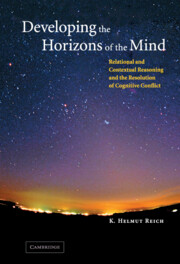 Developing the Horizons of the Mind
Developing the Horizons of the Mind Book contents
- Frontmatter
- Contents
- List of figures
- List of tables
- Acknowledgements
- Introduction
- Part I The Theory of Relational and Contextual Reasoning (RCR) and its Empirical Study
- Part II Applications of RCR
- Overview
- 6 Methodology
- 7 Religion
- 8 The Archaeology of RCR
- 9 Psychology
- 10 Education
- 11 Social Issues
- 12 Conclusions
- Appendix 1 Interviewing techniques
- Appendix 2 Scoring manual for RCR
- References
- Index
12 - Conclusions
Published online by Cambridge University Press: 22 September 2009
- Frontmatter
- Contents
- List of figures
- List of tables
- Acknowledgements
- Introduction
- Part I The Theory of Relational and Contextual Reasoning (RCR) and its Empirical Study
- Part II Applications of RCR
- Overview
- 6 Methodology
- 7 Religion
- 8 The Archaeology of RCR
- 9 Psychology
- 10 Education
- 11 Social Issues
- 12 Conclusions
- Appendix 1 Interviewing techniques
- Appendix 2 Scoring manual for RCR
- References
- Index
Summary
This volume
Having presented in Part I the arguments and evidence for the existence of RCR, its nature and its development, in Part II I have discussed a number of cases in support of the claim that applying RCR can further (1) scientific insights and (2) social integration, or at least diminish social strife and disruption. The status of the various examples in Part II is visibly quite different, ranging from the tentative explicatory (e.g., ‘functional background music’) to the inferential (e.g., the relation between RCR and religious judgement, the Swiss and the Frankfurt experience with fighting illegal use of narcotics) to the empirically supported (results of interviews on ‘nuclear accidents’, ‘the two natures of Jesus Christ’, and on the ‘Holy Trinity’), to initial projects (‘rehabilitation of depressed areas’). Each time, by applying RCR a more complete, more encompassing yet more differentiated view is searched for or results together with internal links and context dependences. In that process three differing concerns require attention (Fahrenberg 1992, pp. 52–9 – see pp. above): the methodological, the epistemological, and the ontological. Methodologically, each categorically distinct aspect calls for an appropriate research approach (cf. the example of researching anxiety, p. 151 above), which includes its own verification procedures and terminology. Epistemologically, one wants to keep each aspect separate, in particular as regards causal explanations, yet take all (linked) aspects into account for a synopsis or even an overarching theory.
- Type
- Chapter
- Information
- Developing the Horizons of the MindRelational and Contextual Reasoning and the Resolution of Cognitive Conflict, pp. 185 - 190Publisher: Cambridge University PressPrint publication year: 2002


